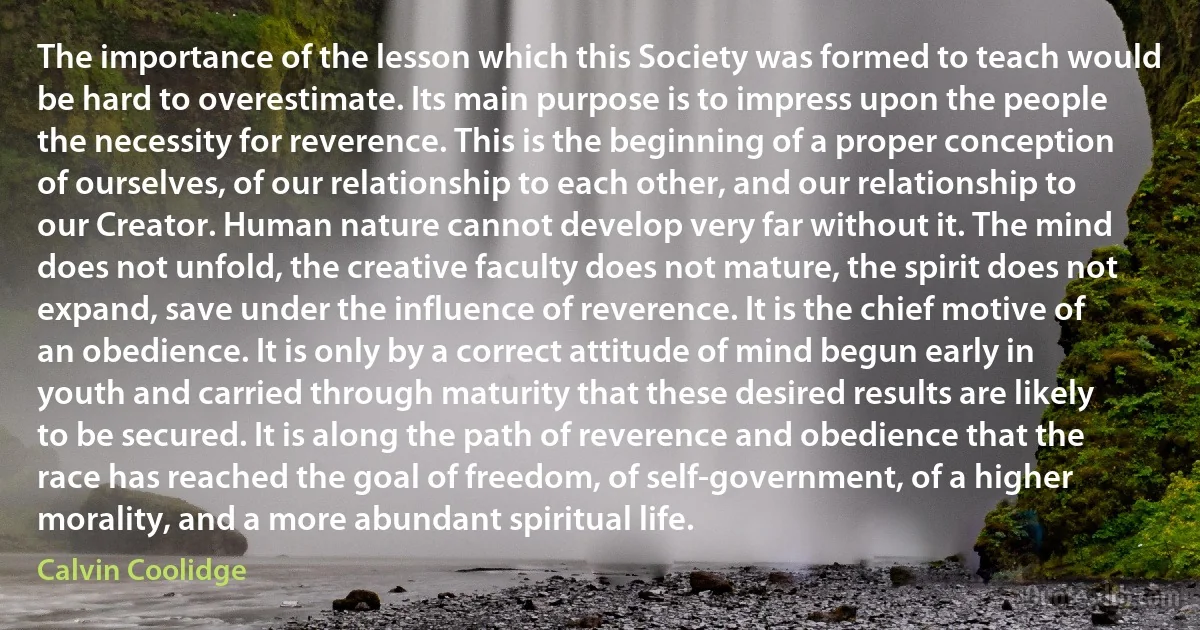
The importance of the lesson which this Society was formed to teach would be hard to overestimate. Its main purpose is to impress upon the people the necessity for reverence. This is the beginning of a proper conception of ourselves, of our relationship to each other, and our relationship to our Creator. Human nature cannot develop very far without it. The mind does not unfold, the creative faculty does not mature, the spirit does not expand, save under the influence of reverence. It is the chief motive of an obedience. It is only by a correct attitude of mind begun early in youth and carried through maturity that these desired results are likely to be secured. It is along the path of reverence and obedience that the race has reached the goal of freedom, of self-government, of a higher morality, and a more abundant spiritual life.
Calvin CoolidgeRelated topics
beginning begin carry chief conception correct creative early faculty far freedom hard human impress life likely mind nature necessity overestimate path people proper purpose race save self-government spirit teach under unfold youth higherRelated quotes
Let us imagine that the aboriginal-original human specimen was one of two brother apes, A and B; they were alike in every respect; both were animal space-binders; but something strange happened to B; he became the first time-binder, a human. ... He had thus a new faculty, he belonged to a new dimension; but, of course, he did not realize it; and because he had this new capacity he was able to analyze his brother "A"; he observed "A is my brother; he is an animal; but he is my brother; therefore, I AM AN ANIMAL." This fatal first conclusion, reached by false analogy, by neglecting a fact, has been the chief source of human woe for half a million years and it still survives. ... He [then] said to himself, "If I am an animal there is also in me something higher, a spark of some thing supernatural."

Alfred Korzybski
For what advantage is it, that the world enjoys profound peace, if thou art at war with thyself? This then is the peace we should keep. If we have it, nothing from without will be able to harm us. And to this end the public peace contributes no little: whence it is said, ‘That we may lead a quiet and peaceable life.' But if any one is disturbed when there is quiet, he is a miserable creature. Seest thou that He speaks of this peace which I call the third (inner, ed.) kind? Therefore when he has said, ‘that we may lead a quiet and peaceable life,' he does not stop there, but adds ‘in all godliness and honesty.' But we cannot live in godliness and honesty, unless that peace be established. For when curious reasonings disturb our faith, what peace is there? or when spirits of uncleanness, what peace is there?

John Chrysostom
WHAT HAPPENS AFTER DEATH?
When a human soul goes out of the body, some great mystery happens. For if it is guilty of sins, then there come hordes of demons, evil angels and dark forces, take that soul and drag it to their side.
No one should be surprised at that, because if a man surrendered and fell prey to them while still alive in this world, will not they have even greater control over him and enslave him when he departs from this world?
As for the other, the better part of people, something different happens to them. There are Angels around the holy servants of God in this life; the holy spirits surround them and protect them; and when their souls are separated from the body, the choir of Angels welcomes them into their fellowship, into a bright life, and thus leads them to the Lord.

Macarius of Egypt
If my history lesson has done nothing else, it should have reminded you that, during any given period in the evolving history of physics, the prevailing, main line, climate of opinion was likely as not to be wrong, as seen in the light of later developments. And yet, in those earlier times, with relatively few individuals involved, change did occur, but slowly... What is fundamentally different in the present day situation in high energy physics is that large numbers of workers are involved, with corresponding pressures to conformity and resistance to any deflection in direction of the main stream, and that the time scale of one scientific generation is much too long for the rapid pace of experimental discovery. I also have a secret fear that new generations may not necessarily have the opportunity to become familiar with dissident ideas.

Julian Schwinger
I have encountered a few "creationists" and because they were usually nice, intelligent people, I have been unable to decide whether they were really mad, or only pretending to be mad. If I was a religious person, I would consider creationism nothing less than blasphemy. Do its adherents imagine that God is a cosmic hoaxer who has created the whole vast fossil record for the sole purpose of misleading humankind? And, although I do not necessarily agree with the paleontologist Teilhard de Chardin's advocacy of evolution as a major proof of the glory of God, de Chardin's attitude is both logical and inspiring. A creator who laid the foundations for the entire future at the beginning of time is far more awesome than a clumsy tinkerer who constantly modifies his creations and throws away entire species in the process.

Arthur C. Clarke
